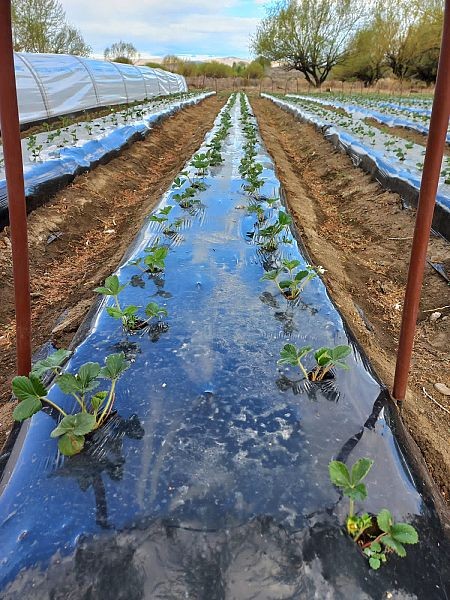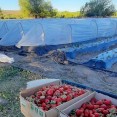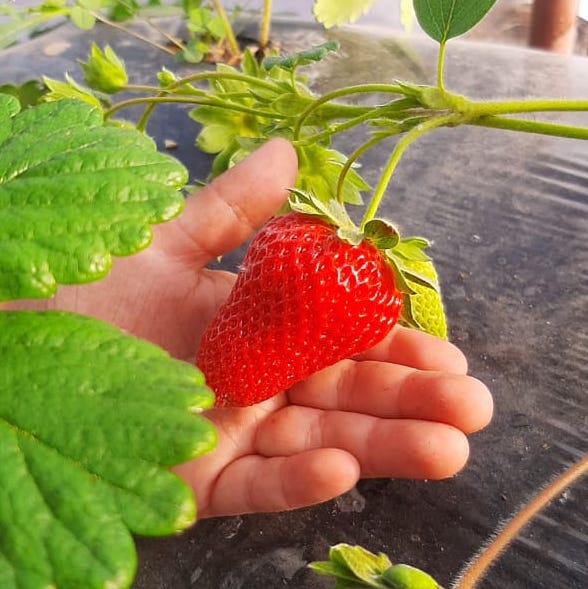In Trelew, Chubut, the students from the local Technical School have installed a new wind-solar hybrid system, capable of providing opportunity for energy self-sufficiency in the rural community.
Wind Strawberries - News from Patagonia
Many small rural farmers in the areas of Chubut and the Río Negro provinces in the argentinian steppe struggle with essential problems in their everyday life: the access to water, sufficient supply of energy and a low income – often below the poverty line. A resource that has the potential to fulfill the needs for productive use was long abandoned: wind energy. A new wind energy project that launched this summer now bears its first fruits.
In the last years, WISIONS has been increasingly involved in projects focusing on the productive use of energy and its impact on rural livelihoods. With Fundación 500RPM we have a partner with long standing experience in implementing holistic wind energy systems. In cooperation with INTA (the National Institute of Agricultural Technology Argentina) and its expertise in improved agricultural practices, they developed three projects for productive use of wind energy in the context of horticultural production. One sub-project that Fundación 500RPM and WISIONS are collaborating on has been successfully implemented: The strawberry plantation of the Peña family is now powered with wind energy! The project was driven by a holistic approach on energy access which includes capacity building and the consideration of management aspects from the beginning, as can be seen in the following project outline:
The Peña family runs an isolated family farm in the Municipality of Gualjaina not connected to the electric grid. The main economic activity of the family is livestock farming, for the sale of wool and meat. They also produce vegetables mostly for their own self-sufficiency. The Peña family strives to improve their economic situation and in collaboration with Fundación 500RPM they developed the idea to start growing strawberries for sale, which have a high added value in that region. Concentrating on a single crop has the benefit of allowing greater harvests, promising better prices and higher margins.

To provide an adequate water supply, the Peñas, together with our local project partner, installed a wind turbine that generates the power for a water pump which sufficiently supplies the plantation. The installation was accompanied by technical training on how to construct and maintain the turbines to ensure that the family is capable of running the new system independently. The workshops were hosted at two technical schools in the region (The Agrotechnical School of Cholila and Esquel Polytechnic School) to integrate local students in the training and construction process. Besides all these considerations for achieving a sustainable energy delivery model, the partnership with INTA was also crucial: They brought its long expertise on agricultural technologies adapted to the region and provided the required support to the Peñas in terms of agricultural techniques as well as of marketing strategies for their new production system. Once the first fruits are ripe for harvest the strawberries will be sold regionally at larger stores in the urban centers of Patagonia, which guarantees higher prices than selling the crops locally.
The results of the labour showed in mid November, when the first ripe strawberries were harvested. To show what went into their production, the strawberries from the Peña farm were given the name “Frutillas del Viento” – Wind Strawberries.
Even after the implementing the new plantation, the Peñas will stay in touch with our project partners ensuring that the long-term impacts of the project can be evaluated. The project will serve as a precedent for productive use of wind energy in Patagonia and as a role model for new horticultural projects with small rural producers who face similar obstacles (access to water, energy and a low income).


More generel information on this SEPS projects is available on our SEPS project page: Productive Use of Wind in Argentina – Developing Rural Areas with an Abundant Resource (SEPS15)
Stay tuned for more updates on the strawberry enterprise of the Peña family and other wind energy projects in Patagonia!


